Related Research Articles
E. W. Emo was an Austrian film director.
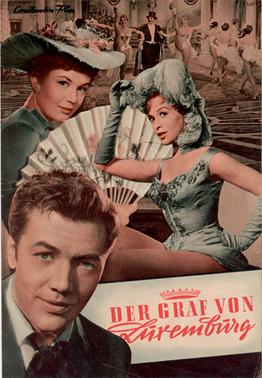
The Count of Luxemburg is a 1957 West German musical comedy film directed by Werner Jacobs and starring Gerhard Riedmann, Renate Holm and Gunther Philipp. It is based on the 1909 operetta The Count of Luxemburg by Franz Lehár.

You Don't Forget Such a Girl is a 1932 Austrian-German romantic comedy film directed by Fritz Kortner and starring Willi Forst, Dolly Haas, and Oskar Sima. The film was shot at the Halensee Studios in Berlin. It was the last film made by Kortner before he went into exile following the Nazi takeover of 1933.

Maria Ilona is a 1939 German historical drama film directed by Géza von Bolváry and starring Paula Wessely, Willy Birgel, and Paul Hörbiger. The film is set in Austria during the reign of Ferdinand I. It is an adaptation of Oswald Richter-Tersik's novel Ilona Beck.
Karin Lesch is a Swiss-German stage, cinema, and television actress, of Swiss-Austrian extraction; who hails from a multi-generational family of accomplished German-speaking performers of theatre and cinema.

Suburban Cabaret is a 1935 Austrian musical drama film directed by Werner Hochbaum and starring Mathias Wieman, Luise Ullrich and Oskar Sima. It was shot at the Sievering Studios in Vienna. The film's sets were designed by the art director Alfred Kunz. It is based on the play Der Gemeine by Felix Salten.
Whom the Gods Love is a 1942 Austrian historical musical film directed by Karl Hartl and starring Hans Holt, Irene von Meyendorff, and Winnie Markus. The film is a biopic of the Austrian composer Wolfgang Amadeus Mozart. It was made as a co-production between the giant German studio UFA and Wien-Film which had been set up following the German annexation of Austria. The film was part of a wider attempt by the Nazis to portray Mozart as an authentic German hero. Like many German biopics of the war years, it portrays the composer as a pioneering visionary.

Operetta is a 1940 German musical film directed by Willi Forst and starring Forst, Maria Holst and Dora Komar. The film was made by Wien-Film, a Vienna-based company set up after Austria had been incorporated into Greater Germany following the 1938 Anschluss. It is the first film in director Willi Forst's "Viennese Trilogy" followed by Vienna Blood (1942) and Viennese Girls (1945). The film portrays the life of Franz Jauner (1832–1900), a leading musical figure in the city. It is both an operetta film and a Wiener Film.
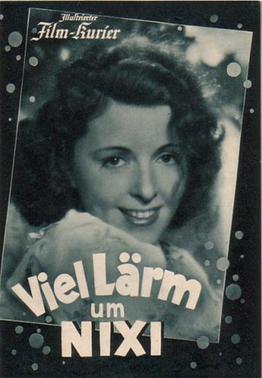
Much Ado About Nixi is a 1942 German comedy film directed by Erich Engel and starring Jenny Jugo, Albert Matterstock and Hans Leibelt. It was shot at the Cinecittà studios in Rome. A separate Italian-language version was also produced.
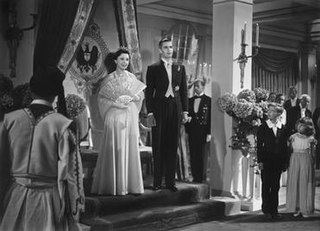
Royal Children is a 1950 West German comedy film directed by Helmut Käutner and starring Jenny Jugo, Peter van Eyck and Hedwig Wangel. It was shot at the Bavaria Studios in Munich and on location in Bad Wimpfen and at Hornberg Castle. The film's sets were designed by the art director Bruno Monden and Hermann Warm. It was a major commercial failure on release.

Mathilde Danegger was an Austrian stage and movie actress. Sources may also identify her by the pseudonym, Mathilde Leusch; Leusch is apparently a variant of her second husband's surname (Lesch).

A Mother's Love or Mother Love is a 1939 drama film directed by Gustav Ucicky and starring Käthe Dorsch, Paul Hörbiger and Wolf Albach-Retty.

Roses in Tyrol is a 1940 German musical comedy film directed by Géza von Bolváry and starring Hans Moser, Marte Harell, and Johannes Heesters. It is based on the 1891 operetta The Bird Seller by Carl Zeller, which has been turned into several films.
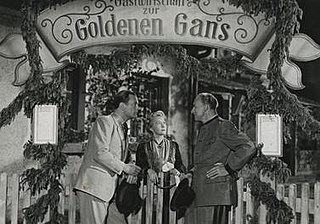
Kissing Is No Sin is a 1950 Austrian-German comedy film directed by Hubert Marischka and starring Curd Jürgens, Hans Olden and Hans Moser. The film takes its title from the waltz "Küssen ist keine Sünd" in Edmund Eysler's 1903 operetta Bruder Straubinger and features the song in its soundtrack.

Yes, Yes, Love in Tyrol is a 1955 West German musical comedy film directed by Géza von Bolváry and starring Gerhard Riedmann, Hans Moser, and Doris Kirchner. It is a loose reworking of the plot of the play Kohlhiesel's Daughters by Hanns Kräly.
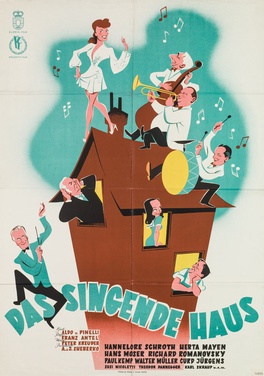
The Singing House is a 1948 Austrian comedy film directed by Franz Antel and starring Richard Romanowsky, Hannelore Schroth and Hans Moser. It was first shown at the Locarno Film Festival in July 1947, before going on general release in Austria in early 1948.

The Heavenly Waltz is a 1948 Austrian comedy film directed by Géza von Cziffra and starring Elfie Mayerhofer, Paul Hubschmid and Inge Konradi.

Archduke Johann's Great Love is a 1950 Austrian historical romantic drama film directed by Hans Schott-Schöbinger and starring Marte Harell, O.W. Fischer and Christl Mardayn.
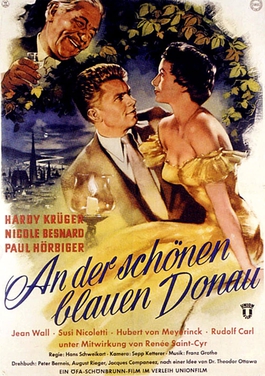
The Blue Danube is a 1955 Austrian romantic comedy film directed by Hans Schweikart and starring Hardy Krüger, Nicole Besnard and Paul Hörbiger. It was shot at the Schönbrunn Studios in Vienna and on location around the city. The film's sets were designed by the art director Fritz Jüptner-Jonstorff.